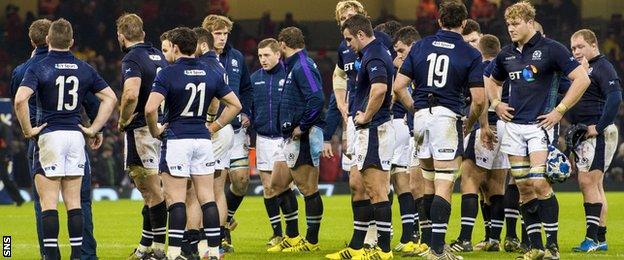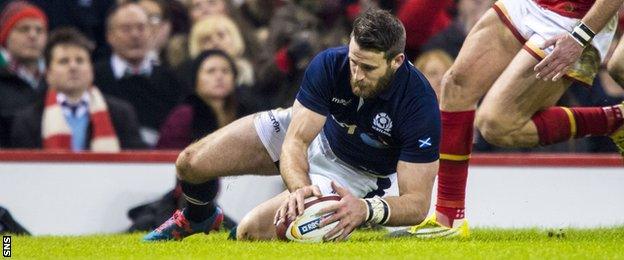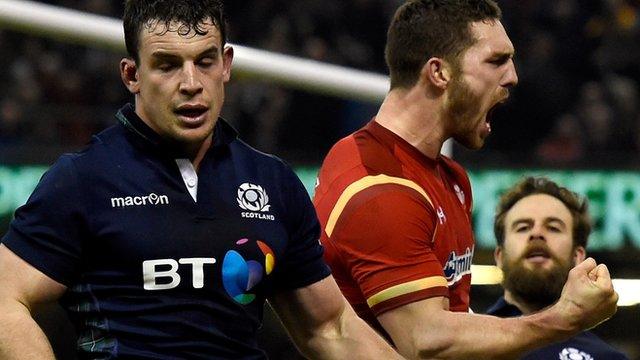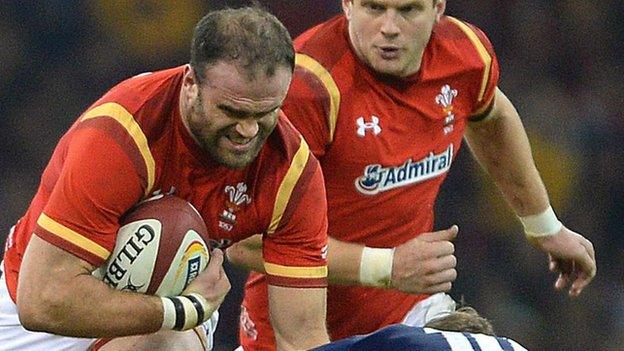Wales 27-23 Scotland: Scots 'trapped in no-man's land'
- Published
BBC Scotland's Six Nations Extra
The clock told us that six minutes and 26 seconds had been played when Gareth Davies completed his odyssey from halfway and touched down for Wales' opening try against Scotland.
Six minutes and 26 seconds and yet those early moments were still being talked about in Cardiff, with increasing vehemence and incoherence, hours later, the conversation sure to carry on in the coming days.
Where was Davies when Dan Biggar dinked his original kick over an advancing guard of four Scots? Where was he when Jamie Roberts batted the ball down from mid-air? Why was he allowed to gather the ball and run to the line? Why didn't the referee spot that he was offside? Why didn't the TMO tell him when he asked?
Rulebooks were consulted and interpretations pored over. He was miles offside, he was a bit offside, he wasn't offside at all. Before nightfall there was a danger of it all getting a little 'Joubertish' in the Scottish ranks.
Soft moments cost Scots - Laidlaw
The decision, either way, was a marginal call. It didn't go Scotland's way and it's not one they should bemoan for too long.
In the despond of a ninth-straight Six Nations loss - and a sixth by a converted try or less - the temptation was to over-egg the injustice, to lash out at the awarding of the 'try that should never have been'.
It's an urge that's best avoided before it mushrooms into a self-pity that's self-defeating.
In truth, Scotland head coach Vern Cotter dealt with it stoically, as he deals with most things. He thought the try was dodgy but he didn't dwell on it. Neither did his captain, Greig Laidlaw. They made their point and they moved on. There was nothing else they could do.
'They can see the light, they just can't reach it'
The bitter reality for Scotland was that when this game was there to be won, it was familiar Welshmen who stepped forward and seized the moment. It was Roberts with their critical second try and George North with their game-winning third.
Those two guys know how to win games. They've won a Lions series, a Grand Slam, a Six Nations championship. Roberts plays alongside Jonathan Davies, who has also won all those prizes. They're led by a winning Lions captain, Sam Warburton. They have at their heart, Alun Wyn Jones, one of the truly great Welsh second-rows and Taulupe Faletau, one of the most remorselessly effective number eights in their history.
Seasoned winners all. And up against them? Players of talent who have won nothing on the Test stage, not a trophy, not even a game, many of them. The gulf in know-how is canyon-wide.
A third of Scotland's starting team in Cardiff - Mark Bennett, Finn Russell, Jonny Gray, WP Nel, John Hardie - have yet to win a Six Nations match.
Tommy Seymour has won once in nine attempts, Duncan Taylor once in six attempts. Six of Scotland's substitutes have a 100% losing record in the Six Nations.
Maybe that explains, in part, why they're finding it so murderously difficult to get across the line.
Stepping back from the grim reality of nine successive championship losses, there was good in this, significantly more positive stuff than we saw a week ago against England.

Scotland suffered a ninth straight Six Nations defeat
Scotland had a better edge and they maintained it for longer. They had more threat, more fire, more ball. It was a step-up from a week ago. Not enough of a step-up, but an improvement.
Here's the thing. Had you picked a composite team before kick-off then Wales would have lorded it. Had you asked a hundred neutrals who was going to win then most of the hundred would have said Wales.
Looked at in that light, a four-point loss away from home against a team that is used to winning and that is studded with Lions was above par for Scotland. But the despond washed over them nonetheless.
This team is trapped in no-man's land. They're stuck in a place between the pitiful dog-days of old and a proper new dawn. They can see the light, but they just can't reach it. And it's excruciating.
There was a moment in Cardiff when even the most disbelieving of Scottish supporters might have shifted forward in their seat, the gates of their easy pessimism being stormed by optimism.
We were in the 52nd minute at the Principality Stadium - let's give it its new name for the old one was little comfort to Scotland - when Russell launched an iffy kick downfield, which was inexplicably spilled by Welsh full-back Liam Williams.
The scores were level at 13-13. Davies' try had been cancelled out by a terrific score by the excellent Seymour and it was the Scots who were asking all the questions.

The impressive Seymour scored Scotland's first try in Cardiff
There were moments that brought flashbacks, missed opportunities that reminded you of similarly spurned chances that cost them dear in the past.
Last week it was Russell missing Stuart Hogg on his outside and putting boot to ball instead. This time it was John Barclay missing Hogg, who soon went off. That was a blow, too. Hogg looked like he was set for a big game out there.
A Barclay pass instead of a kick could, and probably would, have brought a try, but he didn't see it. Other teams can survive moments like that. Scotland rarely can.
But that Williams knock-on made you wonder if this was going to be a day when Scotland got away with it. Instead of Scottish slackness being punished, it was now to bring Scottish reward. The ensuing scrum took place just outside the Welsh 22. Scotland won a free-kick and opted for another scrum. Then they won a penalty, Gethin Jenkins buckling under the strain of Nel's power.
As omens went, this might have seemed like a significant one. Scottish players ran to congratulate their front-row for a job well done. Back-slaps, air-punches and feel-good galore. All of that went up a notch when Laidlaw put over the penalty to make it 16-13 to the visitors.
Highlights: Wales 27-23 Scotland
A few minutes later, Scotland were back in Wales' 22, rumbling forward in a maul and asking the kind of questions they singularly failed to ask England last weekend. Hardie peeled away and went for broke. He was tackled to the deck inside the Welsh 22 and if you could freeze-frame the moment that was possibly the critical passage, the second that everything changed.
Hardie lost possession and Tom James thundered clear up his left wing. He was heading for the corner, seemingly without challenge, when Taylor appeared from a different post code to haul him down. It was a try-saver, no question. A tackle that would have gone down in the annals of great Scottish tackles had the result been different.
Wales' go-to men deliver
The siege on the Scottish line was a long one. It might have lifted had Scotland's line-out fired, but it didn't.
Had Laidlaw collected a routine tap-down from Richie Gray five metres from his own line then the danger might have cleared, but he couldn't do it. He lost concentration. The ball went by him. Soon after, Roberts went over.
That converted try turned a 16-13 Scottish lead into a 20-16 Welsh advantage.
Five minutes later, North cut a diagonal so sharp it could have taken your eye out. As it was, four Scottish defenders found themselves swimming against the tide - or the North Sea. When the wing stepped his way past wrong-footed Scots, that was the game.
In the pivotal moments, Wales' go-to men came through for them. Some of them spoke afterwards about the pain they had to endure to get the job done. Physical rather than psychological. Scotland, brave as could be, left town with a huge dose of both.
- Published13 February 2016

- Published13 February 2016

- Published13 February 2016

- Published13 February 2016
